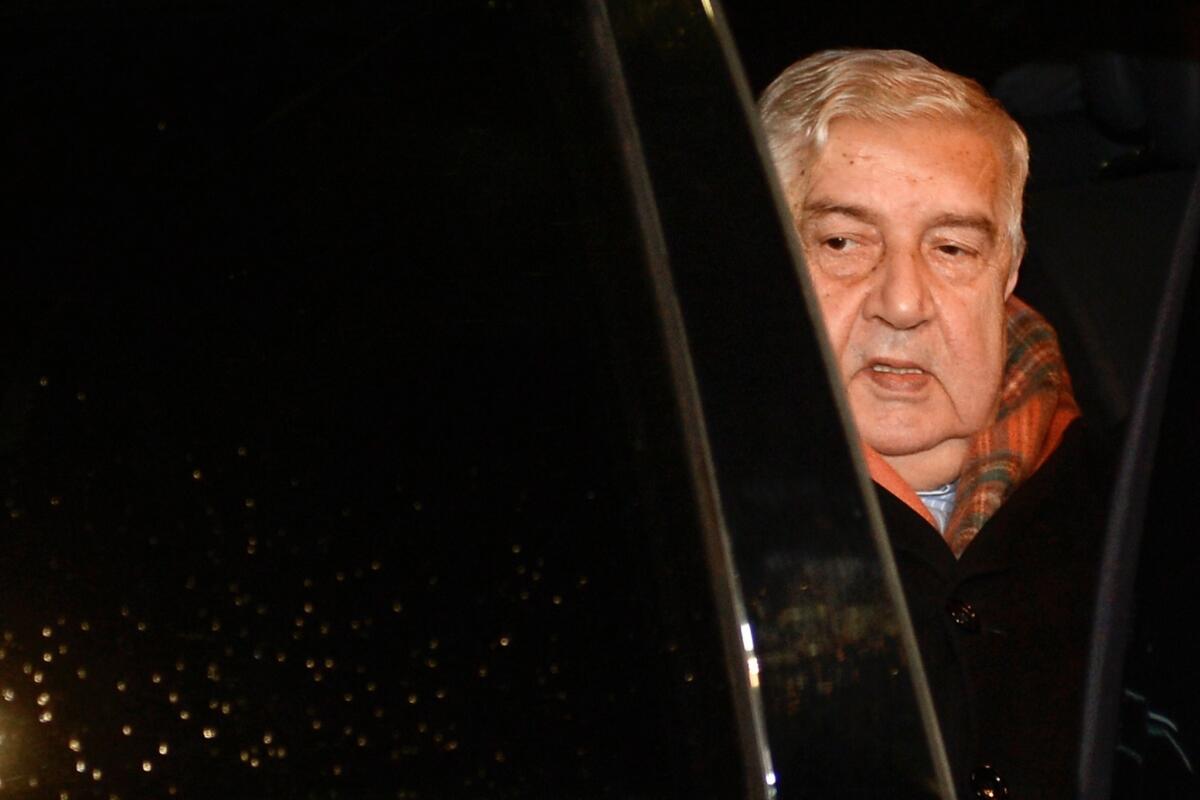Photos may provide evidence of torture, killing of Syria detainees

- Share via
With peace talks due to begin this week in Switzerland, a report lays out new evidence that the Syrian government engaged in the “systematic torture and killing” of detainees that it says could support charges of war crimes and crimes against humanity.
A team of legal and forensics experts, including three lawyers with experience prosecuting war crimes in Sierra Leone and the former Yugoslavia, was asked by a London law firm acting on behalf of Qatar to review about 55,000 images said to show bodies of people who died in Syrian custody.
Their findings, contained in a 31-page report, were made available to CNN and Britain’s Guardian newspaper, along with the United Nations, international governments and human rights groups. [Note: The report contains graphic images.]
The inquiry team concluded that the images document the deaths of about 11,000 people and show evidence of binding, beatings, burns, strangulation and other assaults, including injuries that would not have occurred as a result of armed combat. There are also photographs of severely emaciated bodies and bodies with no eyes.
Many of the disturbing images were said to have been smuggled out of Syria by a defector from the military police, code-named “Caesar” in the report for his safety. The investigators, who said they approached the task of verifying Caesar’s evidence with some skepticism, noted that he did not claim to have witnessed torture or killings himself, which they argued added to the credibility of his account.
Caesar told the inquiry that his job before the war was to photograph crime and accident scenes. But once the uprising began in 2011, leading to the arrest of thousands of people, it was his job to photograph bodies that were taken from detention facilities to a military hospital.
The photographs were taken so that death certificates could be prepared without families seeing the bodies, thus avoiding questions about how the victims died, he was quoted as saying in the report. Documentation was also needed to satisfy authorities that orders to execute detainees had been carried out, he said.
“In the view of the inquiry team, the need to photograph those who were killed is a strong pointer to the fact that the killings were systematic, ordered and directed from above,” the report said.
The authors -- Desmond de Silva, a former chief prosecutor of the Special Court for Sierra Leone; Geoffrey Nice, former lead prosecutor of the late Yugoslav President Slobodan Milosevic at an international criminal tribunal; and David Crane, who indicted former Liberian President Charles Taylor at the Sierra Leone court -- concluded that the material reviewed was evidence of crimes against humanity by the Syrian government and might also support findings of war crimes.
“This report offers further evidence of the systematic violence and brutality being visited upon the people of Syria by the Assad regime,” British Foreign Secretary William Hague was quoted as saying by the Guardian. “We will continue to press for action on all human rights violations in Syria, and for accountability for those who perpetrate them.”
The Syrian government denies allegations of abuse. A spokesman for the Syrian Information Ministry, Bassam Abu Abdullah, questioned the provenance of the photographs, telling the BBC that the investigators should be interviewing Qatar, which paid for the report and has provided support to rebels fighting the government of President Bashar Assad.
The findings, first reported by CNN and the Guardian on Monday, were released ahead of the so-called Geneva II peace conference, which begins Wednesday in the Swiss city of Montreux. The conference aims to find a peaceful resolution to nearly three years of conflict, although expectations are low, especially as fierce fighting continues in Syria.
The United Nations and international human rights groups have documented abuses by both sides in the war.
In its annual World Report released Tuesday, the New York-based Human Rights Watch highlighted the “unchecked slaughter of civilians in Syria.” The rights group accused Russia, which is backed by China, of protecting the Syrian government from U.N. action, such as an arms embargo or referral to the International Criminal Court in The Hague.
“As the Geneva II peace talks begin, with uncertain prospects of success, they shouldn’t become the latest excuse to avoid action to protect Syrian civilians,” said Kenneth Roth, executive director of Human Rights Watch. “This requires real pressure to stop the killing and allow the delivery of the humanitarian aid they need to survive.”
ALSO:
Activists on trial as China steps up campaign against dissent
Photos may provide evidence of torture, killing of Syria detainees
Thai government declares state of emergency as violence escalates
Twitter: @RajaAbdulrahim
More to Read
Sign up for Essential California
The most important California stories and recommendations in your inbox every morning.
You may occasionally receive promotional content from the Los Angeles Times.











